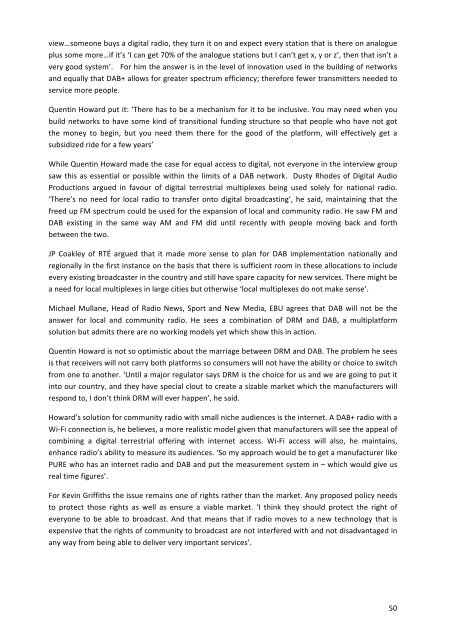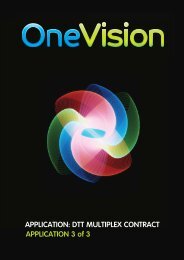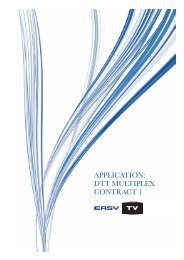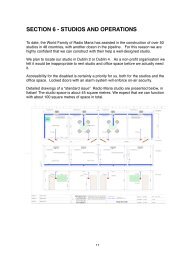Digital Radio for Ireland: Competing Options, Public Expectations - BCI
Digital Radio for Ireland: Competing Options, Public Expectations - BCI
Digital Radio for Ireland: Competing Options, Public Expectations - BCI
You also want an ePaper? Increase the reach of your titles
YUMPU automatically turns print PDFs into web optimized ePapers that Google loves.
view…someone buys a digital radio, they turn it on and expect every station that is there on analogue <br />
plus some more…if it’s ‘I can get 70% of the analogue stations but I can’t get x, y or z’, then that isn’t a <br />
very good system’. For him the answer is in the level of innovation used in the building of networks <br />
and equally that DAB+ allows <strong>for</strong> greater spectrum efficiency; there<strong>for</strong>e fewer transmitters needed to <br />
service more people. <br />
Quentin Howard put it: ‘There has to be a mechanism <strong>for</strong> it to be inclusive. You may need when you <br />
build networks to have some kind of transitional funding structure so that people who have not got <br />
the money to begin, but you need them there <strong>for</strong> the good of the plat<strong>for</strong>m, will effectively get a <br />
subsidized ride <strong>for</strong> a few years’ <br />
While Quentin Howard made the case <strong>for</strong> equal access to digital, not everyone in the interview group <br />
saw this as essential or possible within the limits of a DAB network. Dusty Rhodes of <strong>Digital</strong> Audio <br />
Productions argued in favour of digital terrestrial multiplexes being used solely <strong>for</strong> national radio. <br />
‘There’s no need <strong>for</strong> local radio to transfer onto digital broadcasting’, he said, maintaining that the <br />
freed up FM spectrum could be used <strong>for</strong> the expansion of local and community radio. He saw FM and <br />
DAB existing in the same way AM and FM did until recently with people moving back and <strong>for</strong>th <br />
between the two. <br />
JP Coakley of RTÉ argued that it made more sense to plan <strong>for</strong> DAB implementation nationally and <br />
regionally in the first instance on the basis that there is sufficient room in these allocations to include <br />
every existing broadcaster in the country and still have spare capacity <strong>for</strong> new services. There might be <br />
a need <strong>for</strong> local multiplexes in large cities but otherwise ‘local multiplexes do not make sense’. <br />
Michael Mullane, Head of <strong>Radio</strong> News, Sport and New Media, EBU agrees that DAB will not be the <br />
answer <strong>for</strong> local and community radio. He sees a combination of DRM and DAB, a multiplat<strong>for</strong>m <br />
solution but admits there are no working models yet which show this in action. <br />
Quentin Howard is not so optimistic about the marriage between DRM and DAB. The problem he sees <br />
is that receivers will not carry both plat<strong>for</strong>ms so consumers will not have the ability or choice to switch <br />
from one to another. ‘Until a major regulator says DRM is the choice <strong>for</strong> us and we are going to put it <br />
into our country, and they have special clout to create a sizable market which the manufacturers will <br />
respond to, I don’t think DRM will ever happen’, he said. <br />
Howard’s solution <strong>for</strong> community radio with small niche audiences is the internet. A DAB+ radio with a <br />
Wi‐Fi connection is, he believes, a more realistic model given that manufacturers will see the appeal of <br />
combining a digital terrestrial offering with internet access. Wi‐Fi access will also, he maintains, <br />
enhance radio’s ability to measure its audiences. ‘So my approach would be to get a manufacturer like <br />
PURE who has an internet radio and DAB and put the measurement system in – which would give us <br />
real time figures’. <br />
For Kevin Griffiths the issue remains one of rights rather than the market. Any proposed policy needs <br />
to protect those rights as well as ensure a viable market. ‘I think they should protect the right of <br />
everyone to be able to broadcast. And that means that if radio moves to a new technology that is <br />
expensive that the rights of community to broadcast are not interfered with and not disadvantaged in <br />
any way from being able to deliver very important services’. <br />
<br />
50






